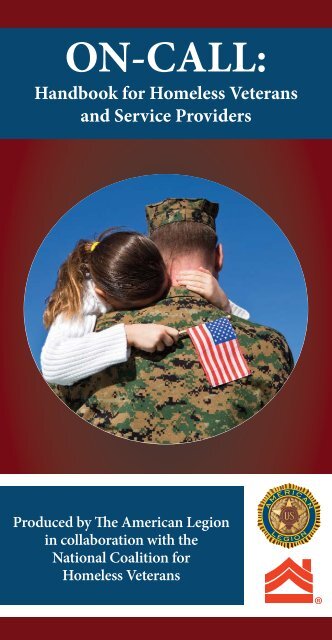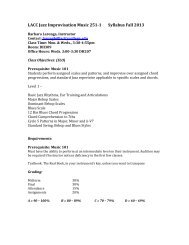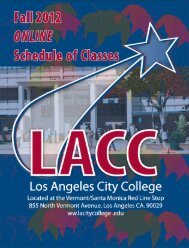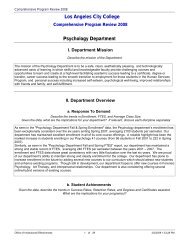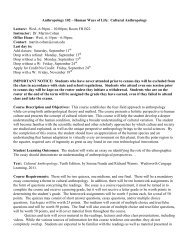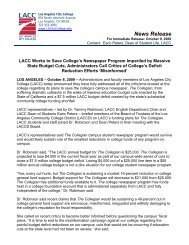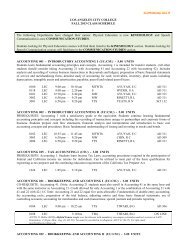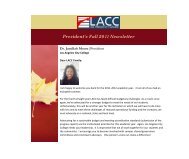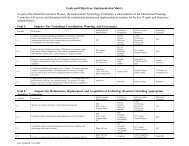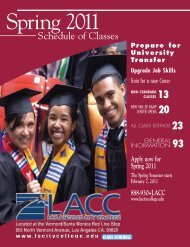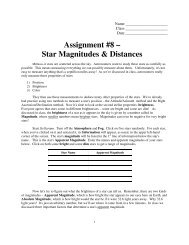ON-CALL: Handbook for Homeless Veterans and Service Providers
ON-CALL: Handbook for Homeless Veterans and Service Providers
ON-CALL: Handbook for Homeless Veterans and Service Providers
Create successful ePaper yourself
Turn your PDF publications into a flip-book with our unique Google optimized e-Paper software.
<strong>ON</strong>-<strong>CALL</strong>:<br />
<strong>H<strong>and</strong>book</strong> <strong>for</strong> <strong>Homeless</strong> <strong>Veterans</strong><br />
<strong>and</strong> <strong>Service</strong> <strong>Providers</strong> <strong>Providers</strong><br />
Produced by by The American Legion<br />
in in collaboration with the<br />
National Coalition <strong>for</strong><br />
<strong>Homeless</strong> <strong>Veterans</strong><br />
®
The American Legion<br />
1608 K Street NW<br />
Washington, DC 20006<br />
The American Legion Auxiliary<br />
8945 N. Meridian St., 2nd Fl.<br />
Indianapolis, IN 46260<br />
National Coalition <strong>for</strong> <strong>Homeless</strong> <strong>Veterans</strong><br />
333 1/2 Pennsylvania Ave. SE<br />
Washington, DC 20003
Contents<br />
<strong>ON</strong>-<strong>CALL</strong>:<br />
<strong>H<strong>and</strong>book</strong> <strong>for</strong> <strong>Homeless</strong> <strong>Veterans</strong> <strong>and</strong> <strong>Service</strong> <strong>Providers</strong><br />
Introduction ................................4<br />
Immediate Assistance ........................5<br />
Overview of Veteran <strong>Homeless</strong>ness ............6<br />
◆ Numbers <strong>and</strong> statistics .....................7<br />
Health Issues <strong>and</strong> Resources ...................8<br />
◆ Women veterans ...........................9<br />
Housing Issues <strong>and</strong> Resources ................10<br />
Employment Issues <strong>and</strong> Resources ............12<br />
◆ Personal identification .....................13<br />
◆ Transportation ...........................14<br />
Legal Assistance ............................14<br />
Starting a <strong>Homeless</strong> Veteran Program .........16<br />
◆ Collaborating with community partners .....17<br />
◆ Working with federal partners ..............18<br />
Legion Assistance <strong>and</strong> Preventive Ef<strong>for</strong>ts ......20<br />
<strong>Service</strong>s from the Legion Auxiliary ...........22<br />
Additional In<strong>for</strong>mation .....................24<br />
On-call 3
Introduction<br />
“<strong>ON</strong>-<strong>CALL</strong>: <strong>H<strong>and</strong>book</strong> <strong>for</strong> <strong>Homeless</strong> <strong>Veterans</strong> <strong>and</strong><br />
<strong>Service</strong> <strong>Providers</strong>” is a brief reference guide <strong>for</strong><br />
veterans in crisis <strong>and</strong> those who seek to help them.<br />
Whether you or someone you know is in need of<br />
housing, employment assistance, health or legal<br />
services, or any number of other supports, this<br />
h<strong>and</strong>book will allow you to take decisive action.<br />
<strong>ON</strong>-<strong>CALL</strong> – which signifies the rich resources<br />
available to help homeless veterans – also provides<br />
preliminary in<strong>for</strong>mation on starting long-term<br />
homeless veteran programs, as well as in<strong>for</strong>mation<br />
on The American Legion <strong>and</strong> the National Coalition<br />
<strong>for</strong> <strong>Homeless</strong> <strong>Veterans</strong> (NCHV)’s educational <strong>and</strong><br />
preventive activities.<br />
This collaboration between The American Legion<br />
<strong>and</strong> NCHV, which represents more than 2,100<br />
community- <strong>and</strong> faith-based organizations<br />
nationwide that serve veterans in crisis, offers an<br />
unprecedented opportunity to equip Legionnaires<br />
with the tools they need to assist homeless veterans.<br />
4
Immediate Assistance is Available<br />
If you or someone you know is homeless or at risk<br />
of homelessness, there is immediate help available.<br />
Please call one of the numbers below <strong>for</strong> assistance.<br />
Toll-free numbers:<br />
◆ For 24/7 assistance, call the National Call Center<br />
<strong>for</strong> <strong>Homeless</strong> <strong>Veterans</strong> at 1-877-4AID VET<br />
(1-877-424-3838).<br />
◆ For assistance locating services in your area, call<br />
the National Coalition <strong>for</strong> <strong>Homeless</strong> <strong>Veterans</strong> at<br />
1-800-VET-HELP (1-800-838-4357).<br />
◆ For emotional crises, call the <strong>Veterans</strong> Crisis Line:<br />
Dial 1-800-273-TALK (8255) <strong>and</strong> press 1.<br />
◆ For domestic violence issues, call the National<br />
Domestic Violence Hotline at 1-800-799-SAFE<br />
(7233).<br />
If you have Internet access:<br />
◆ Visit NCHV’s “Help <strong>for</strong> <strong>Veterans</strong>” webpage at<br />
www.nchv.org, which includes links to: locate<br />
community-based organizations, talk to mental<br />
health clinicians, find local St<strong>and</strong> Down events, <strong>and</strong><br />
contact <strong>Homeless</strong> Veteran Program Coordinators.<br />
◆ Several housing resources may be found by<br />
visiting the Department of Housing <strong>and</strong> Urban<br />
Development (HUD)’s veteran-specific webpage at<br />
www.hudhre.info/<strong>Veterans</strong>Assistance.<br />
On-call 5
6<br />
◆ FirstStep details <strong>and</strong> explains how to apply <strong>for</strong><br />
every major benefit program designed to help<br />
people experiencing homelessness— visit the site<br />
at www.mrsh.net/firststep/firststep%20%28d%29/<br />
index.html.<br />
◆ Find a local food bank at www.feeding america.<br />
org/foodbank-results.aspx.<br />
◆ For disability <strong>and</strong> other benefits claims assistance,<br />
contact your American Legion Department <strong>Service</strong><br />
Officer at www.legion.org/departments.<br />
◆ Department of <strong>Veterans</strong> Affairs (VA) medical<br />
centers provide outreach to justice-involved<br />
veterans. For in<strong>for</strong>mation on the Veteran Justice<br />
Outreach (VJO) Initiative – including a list of local<br />
specialists designated to provide direct outreach,<br />
assessment <strong>and</strong> case management <strong>for</strong> veterans<br />
in local courts <strong>and</strong> jails— go to www.va.gov/<br />
homeless/vjo.asp.<br />
Overview of Veteran <strong>Homeless</strong>ness<br />
Generally, the causes of homelessness can be<br />
grouped into three categories: economic hardships,<br />
health issues <strong>and</strong> lack of af<strong>for</strong>dable housing.<br />
Although these issues affect all homeless individuals,<br />
veterans face additional challenges in overcoming<br />
these obstacles, including: prolonged separation<br />
from traditional supports such as family <strong>and</strong> close<br />
friends; highly stressful training <strong>and</strong> occupational<br />
dem<strong>and</strong>s, which can affect personality, self-esteem<br />
<strong>and</strong> the ability to communicate upon discharge; <strong>and</strong>
non-transferability of some military occupational<br />
specialties into the civilian work<strong>for</strong>ce.<br />
Numbers <strong>and</strong> statistics<br />
According to the most recent report from the<br />
Departments of Housing <strong>and</strong> Urban Development<br />
(HUD) <strong>and</strong> <strong>Veterans</strong> Affairs (VA) – “Veteran<br />
<strong>Homeless</strong>ness: A Supplemental Report to the 2010<br />
Annual <strong>Homeless</strong> Assessment Report to Congress,”<br />
published in October 2011 – 76,329 veterans were<br />
homeless on a single night in January 2010. An<br />
estimated 144,842 veterans spent at least one night<br />
in an emergency shelter or transitional housing<br />
program during a 12-month period (October 2009<br />
through September 2010).<br />
The report determined the following:<br />
◆ In January 2010 four states – Cali<strong>for</strong>nia, Florida,<br />
New York <strong>and</strong> Texas – accounted <strong>for</strong> 50 percent of<br />
all homeless veterans across the country, although<br />
these four states only account <strong>for</strong> 28 percent of the<br />
total veteran population.<br />
◆ Women veterans are at especially high risk of<br />
homelessness. Women veterans are more than<br />
twice as likely to be homeless as women nonveterans.<br />
◆ Young veterans (between ages 18 <strong>and</strong> 30) are at<br />
high risk of using the shelter system, especially<br />
young veterans in poverty. Young veterans are<br />
more than twice as likely to be homeless as their<br />
non-veteran counterparts.<br />
On-call 7
Health Issues <strong>and</strong> Resources<br />
<strong>Homeless</strong> veterans may have serious health <strong>and</strong><br />
hygiene issues that must be addressed. <strong>Veterans</strong> who<br />
are not already enrolled in a supportive residence<br />
program should be referred to the nearest VA<br />
medical center or clinic, or a local community clinic,<br />
<strong>for</strong> assessment <strong>and</strong> treatment— call 1-877-424-3838.<br />
In addition to a general health screening, many<br />
homeless veterans will need to address the following<br />
health issues:<br />
8<br />
◆ Mental health – A large percentage of homeless<br />
veterans experience depression or post-traumatic<br />
stress disorder (PTSD) related to their military<br />
service <strong>and</strong> homelessness.<br />
◆ Substance abuse – Untreated psychosocial<br />
disorders often lead to self-medication with alcohol<br />
<strong>and</strong> drugs. About three-quarters of homeless<br />
veterans have substance abuse <strong>and</strong>/or mental<br />
health issues. Addiction, including prescription<br />
drug addiction, is a disease that requires treatment<br />
<strong>and</strong> follow-up supportive counseling.
◆ Hepatitis C, HIV <strong>and</strong> tuberculosis (TB) – All<br />
homeless people are at a higher risk of contracting<br />
these infectious diseases than the general<br />
population. <strong>Homeless</strong> veterans are at an even<br />
higher risk <strong>for</strong> hepatitis C <strong>and</strong> TB.<br />
◆ Dental care – VA has a dental care program<br />
<strong>for</strong> veterans who are participating in homeless<br />
assistance residency programs.<br />
Women veterans<br />
VA estimates women will soon account <strong>for</strong> 10<br />
percent of the veteran population. Many women<br />
veterans have unique needs, including reproductive<br />
health care, child care, <strong>and</strong> treatment <strong>for</strong> military<br />
sexual trauma.<br />
Call 1-877-222-8387 to find your nearest VA<br />
medical center <strong>and</strong> request help from the following<br />
people:<br />
◆ Women <strong>Veterans</strong> Program Managers are located<br />
in each VA health care facility to assist women<br />
veterans.<br />
◆ Women <strong>Veterans</strong> Coordinators are located in each<br />
VA regional office.<br />
◆ State Women <strong>Veterans</strong> Coordinators are located<br />
in almost all states. Check your phone book<br />
blue pages under “State Government,” “<strong>Veterans</strong><br />
Affairs,” or go to www.naswvc.com.<br />
On-call 9
Housing Issues <strong>and</strong> Resources<br />
Stable housing offers the foundation upon which other<br />
needs, such as health care <strong>and</strong> employment, can be<br />
adequately addressed. <strong>Homeless</strong> veterans should be<br />
referred to transitional housing programs as soon as<br />
possible in order to begin this rehabilitative process.<br />
Call the National Call Center <strong>for</strong> <strong>Homeless</strong> <strong>Veterans</strong> at<br />
1-877-484-3838 to inquire about immediate housing<br />
opportunities. Additionally, the National Coalition <strong>for</strong><br />
<strong>Homeless</strong> <strong>Veterans</strong> (NCHV) can direct callers to local<br />
community service providers— call 1-800-VET-HELP<br />
(838-4357) or visit www.nchv.org.<br />
The Department of Housing <strong>and</strong> Urban Development<br />
(HUD)’s HUDVET National Hotline also provides<br />
in<strong>for</strong>mation to veterans seeking answers to housing<br />
questions— call toll-free at 1-800-998-9999.<br />
The phone book blue pages contain contact in<strong>for</strong>mation<br />
<strong>for</strong> your local (city or county) government’s<br />
department of social or human services. Your office<br />
of the mayor can provide in<strong>for</strong>mation on homeless<br />
programs, <strong>and</strong> potentially low-income housing<br />
coalitions or other homeless advocacy groups.<br />
<strong>Homeless</strong> veterans who are not enrolled in a<br />
homeless assistance or supportive residence program<br />
are not likely to have a fixed address. This makes it<br />
difficult to receive mail <strong>and</strong> possibly phone calls,<br />
which can adversely affect employment prospects<br />
<strong>and</strong> the receipt of VA benefits including disability<br />
payments <strong>and</strong> critical correspondence. If a stable<br />
housing situation has not been established, homeless<br />
10
veterans should obtain permission to receive mail<br />
<strong>and</strong> phone calls at an acceptable location <strong>for</strong> the<br />
short term, e.g. a local shelter, VA clinic (call 1-877-<br />
222-8387 to identify a local facility), veteran service<br />
organization, or church.<br />
Additionally, contact in<strong>for</strong>mation <strong>for</strong> local homeless<br />
assistance programs is available at www.hudhre.info/<br />
<strong>Veterans</strong>Assistance.<br />
Long-term or permanent housing<br />
Public housing waiting lists are usually long, but<br />
the length of time varies among areas. <strong>Homeless</strong><br />
veterans should apply to get on these lists, giving<br />
them as many options as possible in time. To contact<br />
a local Public Housing Agency (PHA), visit www.<br />
hud.gov/offices/pih/pha/contacts/index.cfm, or<br />
look in the phone book blue pages under “Local<br />
Government,” “Housing Authority.”<br />
Cabrillo Apartments, U.S. <strong>Veterans</strong> Initiative<br />
Photo courtesy of Century Housing<br />
On-call 11
Employment Issues <strong>and</strong> Resources<br />
The Department of Labor (DOL)’s <strong>Veterans</strong>’<br />
Employment <strong>and</strong> Training <strong>Service</strong> (VETS) offers<br />
nationwide assistance. The agency’s website features<br />
a state-by-state employment assistance map— visit<br />
www.dol.gov/vets/aboutvets/contacts/map.htm <strong>and</strong><br />
click on your state to retrieve contact in<strong>for</strong>mation<br />
<strong>for</strong> your Director <strong>for</strong> <strong>Veterans</strong>’ Employment <strong>and</strong><br />
Training (DVET).<br />
DOL funds thous<strong>and</strong>s of trained <strong>and</strong> certified Local<br />
<strong>Veterans</strong>’ Employment Representatives (LVERs)<br />
<strong>and</strong> Disabled <strong>Veterans</strong>’ Outreach Program (DVOP)<br />
representatives, who identify employment opportunities<br />
<strong>and</strong> work to help veterans find <strong>and</strong> keep jobs.<br />
These specialists are located in state, municipal <strong>and</strong><br />
county employment offices nationwide <strong>and</strong> can be<br />
reached via your state’s employment service office.<br />
See the web address above, or visit www.dol.gov/<br />
vets/aboutvets/contacts/main.htm <strong>for</strong> your VETS<br />
employment office’s contact in<strong>for</strong>mation.<br />
12<br />
<strong>Homeless</strong> <strong>Veterans</strong> Reintegration Program<br />
(HVRP)<br />
Offered by DOL-VETS, the <strong>Homeless</strong> <strong>Veterans</strong><br />
Reintegration Program provides grants to service<br />
providers across the nation to help homeless veterans<br />
reintegrate into the work<strong>for</strong>ce. Many organizations<br />
that receive HVRP funds also provide access to<br />
transitional housing <strong>and</strong> supportive services.<br />
The HVRP National Technical Assistance Center –<br />
comprised of NCHV <strong>and</strong> the Burton Blatt Institute<br />
at Syracuse University – provide lists of current
grantees. These lists can be accessed at www.nchv.<br />
org/employment_assistance.cfm or http://bbi.syr.<br />
edu/nvtac/grantees/index.htm.<br />
Personal identification<br />
Many homeless veterans do not have the personal<br />
identification documents required to obtain<br />
employment. The following may be needed:<br />
◆ Photo ID – VA eligibility <strong>and</strong> veteran status<br />
confirmation cards are a <strong>for</strong>m of photo<br />
identification. The National Call Center <strong>for</strong><br />
<strong>Homeless</strong> <strong>Veterans</strong> (1-877-424-3838) can direct<br />
you to your local <strong>Homeless</strong> Veteran Program<br />
Coordinator, who can provide more in<strong>for</strong>mation<br />
about obtaining a photo ID. State motor vehicle<br />
departments also provide this service <strong>for</strong> a fee.<br />
◆ DD 214 – <strong>Veterans</strong> are entitled to one free copy<br />
of their service <strong>and</strong> medical records. To submit a<br />
request, go to www.archives.gov/veterans/militaryservice-records/.<br />
Additionally, a signed <strong>and</strong> dated<br />
request may be faxed to the National Archives’<br />
National Personnel Record Center (NPRC) at<br />
314-801-9195. Requests may also be mailed to the<br />
following address: National Personnel Records<br />
Center, Military Personnel Records, 9700 Page<br />
Avenue, St. Louis, MO 63132-5100.<br />
◆ Birth certificate – Contact the appropriate office<br />
within your state’s department of health. For<br />
complete state-by-state contact in<strong>for</strong>mation, visit<br />
the page “Where to Write <strong>for</strong> Vital Records” at<br />
www.cdc.gov/nchs/w2w.htm.<br />
On-call 13
◆ Social Security Card – Contact your nearest Social<br />
Security office— look in the phone book blue<br />
pages under “U.S. Government,” “Social Security<br />
Administration,” or call 1-800-772-1213. For more<br />
in<strong>for</strong>mation on replacing a Social Security card, go<br />
to www.socialsecurity.gov/ssnumber.<br />
14<br />
Transportation<br />
Community-based service providers may offer<br />
or be aware of transportation services available<br />
to homeless veterans. Call 1-877-424-3838 (VA)<br />
or 1-800-838-4357 (NCHV) <strong>for</strong> referrals to local<br />
organizations.<br />
Additionally, check the phone book yellow pages<br />
under “<strong>Homeless</strong>” or “Social <strong>Service</strong> Organizations”<br />
<strong>for</strong> listings of groups that may offer transportation<br />
services.<br />
Legal Assistance<br />
A clear legal record can be the foundation upon<br />
which homeless veterans secure gainful employment<br />
<strong>and</strong> independent housing. Certain service providers<br />
have special arrangements with local court systems<br />
to help clients who have restrictive legal histories.<br />
The <strong>Homeless</strong> Court Program, <strong>for</strong> instance, is a<br />
collaboration between the court <strong>and</strong> homeless<br />
service providers in which clients’ participation in<br />
program activities is recognized as “payment” <strong>for</strong><br />
mostly minor offenses.
The Department of <strong>Veterans</strong> Affairs (VA) has strongly<br />
encouraged its medical centers to develop working<br />
relationships with the court system <strong>and</strong> local law<br />
en<strong>for</strong>cement. Each center has designated a facilitybased<br />
Veteran Justice Outreach (VJO) Specialist, who<br />
is responsible <strong>for</strong> direct outreach, assessment <strong>and</strong> case<br />
management <strong>for</strong> justice-involved veterans. For a list<br />
of contacts, visit VA’s VJO Initiative website at<br />
www.va.gov/homeless/vjo.asp.<br />
The following resources can lead homeless veterans<br />
to free legal help in their regions:<br />
◆ FindLegalHelp.org – Features a state-bystate<br />
listing of legal help, including basic legal<br />
in<strong>for</strong>mation, in<strong>for</strong>mation on the court system,<br />
lawyer referrals <strong>and</strong> directories, <strong>and</strong> free legal help.<br />
◆ LawHelp.org – Helps low- <strong>and</strong> moderate-income<br />
people find free legal aid programs in their<br />
communities as well as answers to questions<br />
about legal rights. Also features a state-by-state<br />
list of legal aid referrals <strong>and</strong> in<strong>for</strong>mation on topics<br />
including disabilities, military <strong>and</strong> veterans’ affairs,<br />
<strong>and</strong> employment.<br />
On-call 15
◆ American Bar Association (ABA) Commission<br />
on <strong>Homeless</strong>ness <strong>and</strong> Poverty – Coordinates<br />
with national, state <strong>and</strong> local advocates <strong>and</strong><br />
organizations to facilitate the exchange of<br />
in<strong>for</strong>mation <strong>and</strong> resources. For more in<strong>for</strong>mation,<br />
including details on <strong>Homeless</strong> Courts, go to<br />
www.abanet.org/homeless.<br />
Starting a <strong>Homeless</strong> Veteran Program<br />
The first step in starting a homeless veteran program<br />
is to determine the need in your community. This<br />
need can be assessed by contacting the <strong>Homeless</strong><br />
Veteran Program Coordinator at your nearest VA<br />
medical center (call 1-877-424-3838); local homeless<br />
veteran service providers (www.nchv.org/network.<br />
cfm); <strong>for</strong>merly homeless veterans; <strong>and</strong> your city,<br />
county or state’s homeless coalition.<br />
In this preliminary process, you will want to answer<br />
the following questions about your community:<br />
◆ How many homeless veterans are there?<br />
◆ How do these homeless veterans compare to the<br />
overall homeless population?<br />
◆ What services <strong>and</strong> resources are available?<br />
◆ What services <strong>and</strong> resources are missing?<br />
◆ What are the short-, medium- <strong>and</strong> long-term<br />
needs?<br />
16
Collaborating with community partners<br />
For homeless veteran service providers, gaining access<br />
to services that are already provided by communitybased<br />
organizations <strong>and</strong> agencies is critical in<br />
containing costs while maximizing program benefits.<br />
In order to achieve this result, organizations must<br />
engage in collaboration. Collaborative partnerships<br />
are based on a strong sense of purpose, embrace the<br />
perspectives of all team members, <strong>and</strong> require trust<br />
<strong>and</strong> shared responsibility.<br />
Successful collaborations can be built via the<br />
following approaches:<br />
◆ Define your environment – e.g. the overall need,<br />
what is <strong>and</strong> is not being provided, the value you<br />
will add, <strong>and</strong> the value of potential partners.<br />
◆ Define a collective mission – Make sure all<br />
partners have the same broad objective, to fill the<br />
existing gaps in service. Be open to non-traditional<br />
community partners that share this goal.<br />
◆ Be willing to compromise – Focus on your <strong>and</strong><br />
your partners’ contributions to the objective, not<br />
on your differences.<br />
◆ Communicate clearly – Allow every party to<br />
have a say through both <strong>for</strong>mal <strong>and</strong> in<strong>for</strong>mal<br />
communication channels, but have clearly defined<br />
decision makers <strong>and</strong> points of contact.<br />
Other benefits of collaboration include broadened<br />
community support; better in<strong>for</strong>med <strong>and</strong> more<br />
On-call 17
creative, balanced <strong>and</strong> enduring decisions; improved<br />
outreach; <strong>and</strong> greater access to federal, state <strong>and</strong><br />
local funding sources.<br />
18<br />
Working with federal partners<br />
A number of federal grant opportunities are<br />
available to eligible homeless veteran service<br />
providers. The following are some of the primary<br />
federal grant programs:<br />
<strong>Homeless</strong> <strong>Providers</strong> Grant <strong>and</strong> Per Diem (GPD)<br />
Program<br />
Department of <strong>Veterans</strong> Affairs<br />
The GPD Program is offered annually (as funding<br />
permits) to support community-based agencies<br />
providing transitional housing or service centers<br />
<strong>for</strong> homeless veterans. Under the “Capital” grant<br />
component, VA may fund up to 65% of a project <strong>for</strong><br />
construction, acquisition or renovation of facilities,<br />
or to purchase vans to provide outreach <strong>and</strong> services<br />
to homeless veterans. “Per Diem” grants are available<br />
to help offset operational expenses.<br />
For more in<strong>for</strong>mation, go to www.va.gov/homeless/gpd.asp.<br />
<strong>Homeless</strong> <strong>Veterans</strong> Reintegration Program (HVRP)<br />
Department of Labor<br />
The HVRP is a competitive grant program to provide<br />
services to assist in reintegrating homeless veterans<br />
into the work<strong>for</strong>ce. Eligible applicants include<br />
nonprofit organizations, state <strong>and</strong> local work<strong>for</strong>ce<br />
investment boards, local public agencies, as well as<br />
<strong>for</strong>-profit/commercial entities. This is the only
federal program that focuses exclusively on the<br />
employment of homeless veterans.<br />
For more in<strong>for</strong>mation, go to www.dol.gov/vets/<br />
grants/hvrp.htm.<br />
Supportive <strong>Service</strong>s <strong>for</strong> Veteran Families (SSVF)<br />
Program<br />
Department of <strong>Veterans</strong> Affairs<br />
Through this program, VA award grants to private<br />
nonprofit organizations <strong>and</strong> consumer cooperatives<br />
that provide supportive services to very lowincome<br />
veterans <strong>and</strong> their families residing in or<br />
transitioning to permanent housing.<br />
For more in<strong>for</strong>mation, go to www.va.gov/homeless/ssvf.asp.<br />
HUD-VA Supportive Housing (HUD-VASH)<br />
Program<br />
Departments of Housing <strong>and</strong> Urban Development<br />
<strong>and</strong> <strong>Veterans</strong> Affairs<br />
Designed to address the needs of chronically<br />
homeless veterans, the HUD-VASH Program<br />
provides long-term case management, supportive<br />
services <strong>and</strong> permanent housing vouchers to<br />
eligible veterans. Program participants (identified<br />
by VA) rent privately owned housing <strong>and</strong> generally<br />
contribute no more than 30 percent of their income<br />
toward rent. In 2012, HUD will have awarded nearly<br />
48,000 vouchers to public housing agencies in all 50<br />
states <strong>and</strong> the District of Columbia to date.<br />
For more in<strong>for</strong>mation, go to www.va.gov/homeless/<br />
hud-vash.asp.<br />
On-call 19
20<br />
Funding notifications<br />
To sign up <strong>for</strong> federal grant notifications <strong>and</strong><br />
updates, visit www.grants.gov. Additionally, NCHV<br />
newsletters feature both private <strong>and</strong> federal grant<br />
opportunities <strong>for</strong> service providers.<br />
Legion Assistance <strong>and</strong> Preventive Ef<strong>for</strong>ts<br />
The American Legion supports the ef<strong>for</strong>ts of public<br />
<strong>and</strong> private sector agencies <strong>and</strong> organizations<br />
that aid homeless veterans <strong>and</strong> their families. The<br />
Legion coordinates a <strong>Homeless</strong> <strong>Veterans</strong> Task Force<br />
among its departments to augment homeless service<br />
providers <strong>and</strong> fill in the gaps where no assistance<br />
programs are available. All Legion departments<br />
have a Task Force chairperson <strong>and</strong> an Employment<br />
chairperson. The two chairpersons organize<br />
activities with posts in their departments to aid<br />
homeless <strong>and</strong> at-risk veterans <strong>and</strong> their families.<br />
Visit www.legion.org/homeless or call National<br />
Headquarters at 1-800-433-3318 <strong>for</strong> more<br />
in<strong>for</strong>mation <strong>and</strong> resources.<br />
Additional assistance <strong>and</strong> involvement<br />
◆ Department <strong>Service</strong> Officers provide assistance<br />
to veterans seeking disability claims <strong>and</strong> other<br />
benefits within VA— visit www.legion.org/<br />
departmentofficers.
◆ Military.com <strong>and</strong> RecruitMilitary partner with<br />
The American Legion to sponsor approximately<br />
100 career fairs each year. The Legion also partners<br />
with Avue Technologies, which assists veterans<br />
with obtaining state <strong>and</strong> federal employment— see<br />
www.warfighterhome.us.<br />
◆ The Legion sponsors two Small Business<br />
Development Workshops each year at its<br />
Washington <strong>and</strong> National Conventions. These<br />
workshops provide veterans who are establishing<br />
<strong>and</strong>/or seeking to exp<strong>and</strong> their small businesses<br />
with relevant in<strong>for</strong>mation <strong>and</strong> tools to successfully<br />
interact <strong>and</strong> contract with the federal government.<br />
◆ The annual American Legion Golf Classic at<br />
Andrews Air Force Base allows wounded warriors<br />
from Walter Reed National Military Medical<br />
Center (WRNMMC) to play golf (free of charge)<br />
while networking with federal officials, employers<br />
<strong>and</strong> veteran business owners concerning<br />
employment <strong>and</strong> business opportunities.<br />
◆ National Employer Awards are presented to<br />
employers across the country who have established<br />
outst<strong>and</strong>ing records in the employment <strong>and</strong><br />
retention of veterans, workers with disabilities<br />
<strong>and</strong> older workers. Exceptional members of state<br />
employment security agencies also receive awards<br />
from The American Legion.<br />
◆ Through a new initiative with the U.S. Chamber<br />
of Commerce, the Legion hosts job fairs at Legion<br />
Posts across the country, particularly in rural areas.<br />
On-call 21
<strong>Service</strong>s from The Legion Auxiliary<br />
The American Legion Auxiliary has decades of experience<br />
working with service providers <strong>and</strong> linking<br />
those in the military community who are in need<br />
with assistance. The vision of The Auxiliary is to<br />
support The American Legion while becoming the<br />
premier service organization <strong>and</strong> foundation of every<br />
community, providing support <strong>for</strong> veterans, service<br />
members, <strong>and</strong> their families by fostering an atmosphere<br />
of fellowship, patriotism, peace, <strong>and</strong> security.<br />
Similar to The American Legion’s structure, The<br />
Auxiliary consists of a department <strong>for</strong> each state<br />
<strong>and</strong> the District of Columbia. On the local level, The<br />
Auxiliary boasts more than 9,500 U.S. “units.” These<br />
units can be chartered just about anywhere there<br />
are people with the passion <strong>and</strong> desire to become<br />
part of the organization’s mission. American Legion<br />
Auxiliary <strong>for</strong>eign units are located in Australia,<br />
Canada, China, France, Germany, Irel<strong>and</strong>, Mexico,<br />
Philippines, <strong>and</strong> Puerto Rico.<br />
For more in<strong>for</strong>mation, including state department<br />
contacts, go to www.legion-aux.org.<br />
22
The following are among the ways in which The<br />
American Legion Auxiliary serves homeless<br />
veterans <strong>and</strong> their families:<br />
◆ Auxiliary departments <strong>and</strong> units provide grant<br />
assistance to homeless <strong>and</strong> at-risk women<br />
veterans. These grants support temporary housing,<br />
payment of security deposits <strong>and</strong> utility bills, <strong>and</strong><br />
gift cards <strong>for</strong> food <strong>and</strong> clothing <strong>for</strong> families.<br />
◆ Auxiliary units raise money <strong>for</strong> VA Healthcare<br />
<strong>for</strong> <strong>Homeless</strong> <strong>Veterans</strong> facilities by hosting events<br />
such as dinners <strong>and</strong> bake sales.<br />
◆ Money <strong>and</strong> in-kind services are provided to<br />
support St<strong>and</strong> Downs with The American Legion<br />
family.<br />
◆ “Buddy Baskets” are prepared <strong>for</strong> homeless<br />
veterans moving into permanent housing. These<br />
baskets contain basic household items, including<br />
cleaning supplies, bathroom tissue, kitchenware,<br />
<strong>and</strong> light bulbs.<br />
◆ Backpacks are filled with basic daily needs <strong>and</strong><br />
delivered to homeless veterans in local shelters.<br />
◆ Auxiliary units h<strong>and</strong> out small bags with basic<br />
items to homeless veterans. These basic items<br />
include washcloths, socks, soap, shampoo,<br />
toothbrushes, <strong>and</strong> toothpaste.<br />
◆ The American Legion Auxiliary helps The<br />
American Legion renovate homes <strong>and</strong> supply<br />
furnishings <strong>for</strong> homeless veterans.<br />
On-call 23
Additional In<strong>for</strong>mation<br />
<strong>Veterans</strong> <strong>Homeless</strong>ness Prevention Demonstration<br />
The Department of Housing <strong>and</strong> Urban<br />
Development (HUD), in partnership with the<br />
Departments of <strong>Veterans</strong> Affairs (VA) <strong>and</strong><br />
Labor (DOL), have implemented the <strong>Veterans</strong><br />
<strong>Homeless</strong>ness Prevention Demonstration (VHPD).<br />
Through HUD housing assistance, VA case<br />
management services, <strong>and</strong> DOL employment<br />
counseling, this three-agency partnership provides<br />
combined services <strong>for</strong> veterans who are at a high<br />
risk of becoming homeless.<br />
The demonstration project is in effect in five<br />
communities, selected strategically due to their<br />
proximity to a military base, concentration of<br />
returning veterans from Iraq <strong>and</strong> Afghanistan, <strong>and</strong><br />
availability of resources.<br />
◆ Austin, Texas<br />
24<br />
VHPD sites<br />
◆ Seattle/Tacoma, Washington<br />
◆ Utica/Watertown, New York<br />
◆ Tampa, Florida<br />
◆ San Diego, Cali<strong>for</strong>nia<br />
Local contact in<strong>for</strong>mation <strong>for</strong> all five sites is<br />
available at www.hudhre.info/<strong>Veterans</strong>Assistance.
Project CHALENG<br />
Since 1993, VA has collaborated with local<br />
communities across the United States on Project<br />
CHALENG (Community <strong>Homeless</strong>ness Assessment,<br />
Local Education <strong>and</strong> Networking Groups) <strong>for</strong><br />
<strong>Veterans</strong>.<br />
The project aims to bring together homeless <strong>and</strong><br />
<strong>for</strong>merly homeless veterans (referred to in the report<br />
as “consumers”), service providers, advocates, local<br />
officials, <strong>and</strong> other concerned citizens to identify<br />
the needs of homeless veterans <strong>and</strong> then work to<br />
meet those needs through planning <strong>and</strong> cooperative<br />
action.<br />
Project CHALENG is the only comprehensive<br />
national ef<strong>for</strong>t to poll VA staff, community<br />
providers, <strong>and</strong> consumers about the needs of<br />
homeless veterans. The results help VA identify<br />
specific interventions needed to effectively assist<br />
homeless veterans.<br />
Local CHALENG meetings, where attendees<br />
complete the Participant or Consumer Survey,<br />
represent important opportunities <strong>for</strong> VA <strong>and</strong> public<br />
<strong>and</strong> private agency representatives to meet, network,<br />
<strong>and</strong> develop meaningful partnerships to better serve<br />
homeless veterans.<br />
For more in<strong>for</strong>mation <strong>and</strong> to download the most<br />
recent CHALENG report, go to www.va.gov/<br />
homeless/chaleng.asp.<br />
On-call 25
Notes<br />
26
On-call 27
The need <strong>for</strong> comprehensive federal<br />
<strong>and</strong> local supportive, veteran-specific<br />
programs <strong>for</strong> homeless veterans is<br />
well-documented.<br />
These men <strong>and</strong> women answered the<br />
call to serve their country in a way<br />
increasingly few Americans ever will.<br />
They deserve nothing less than the<br />
full measure of our support in their<br />
greatest hour of need.<br />
Stock #: 74-005 Artwork #: 17EC<strong>ON</strong>0412


